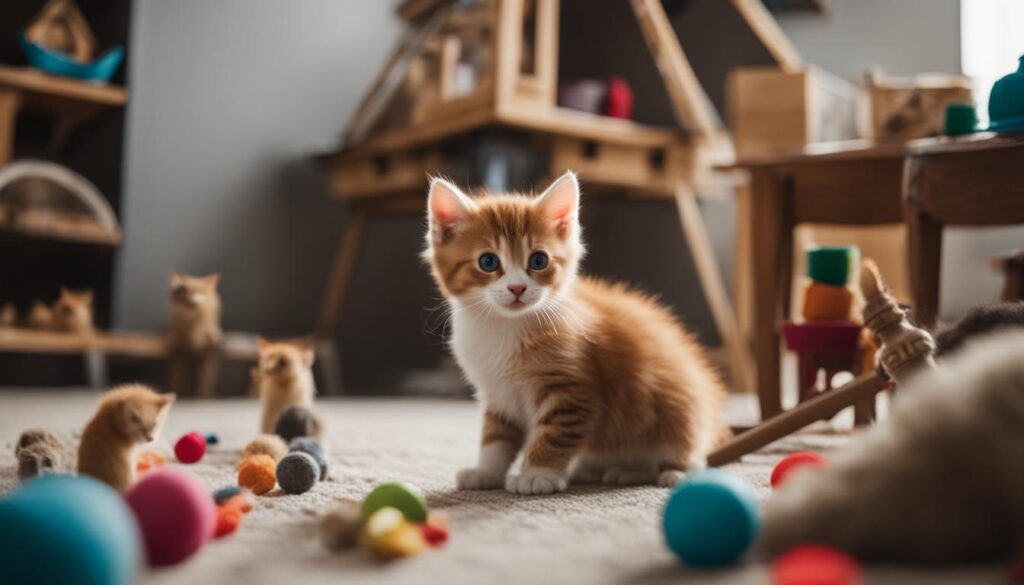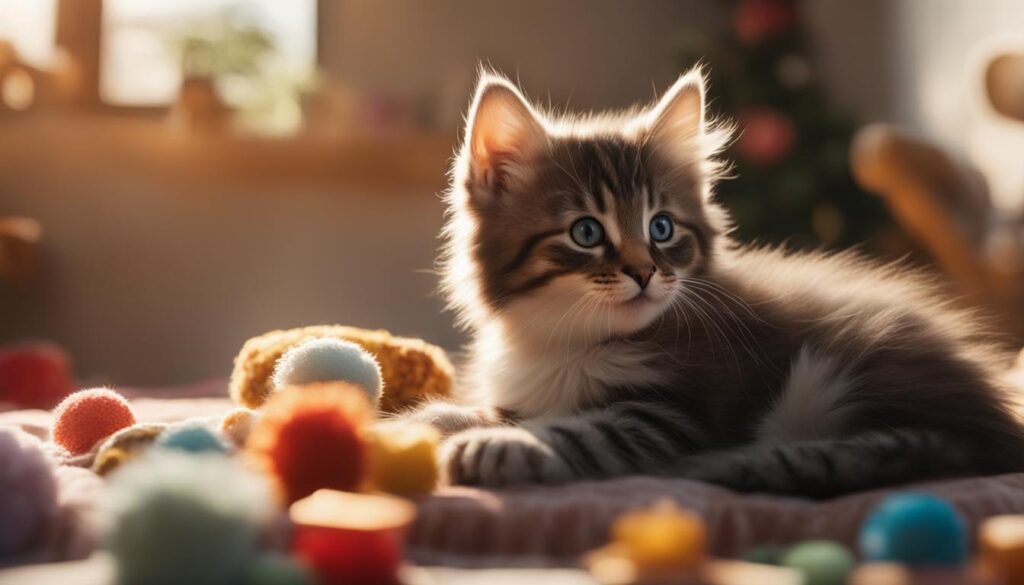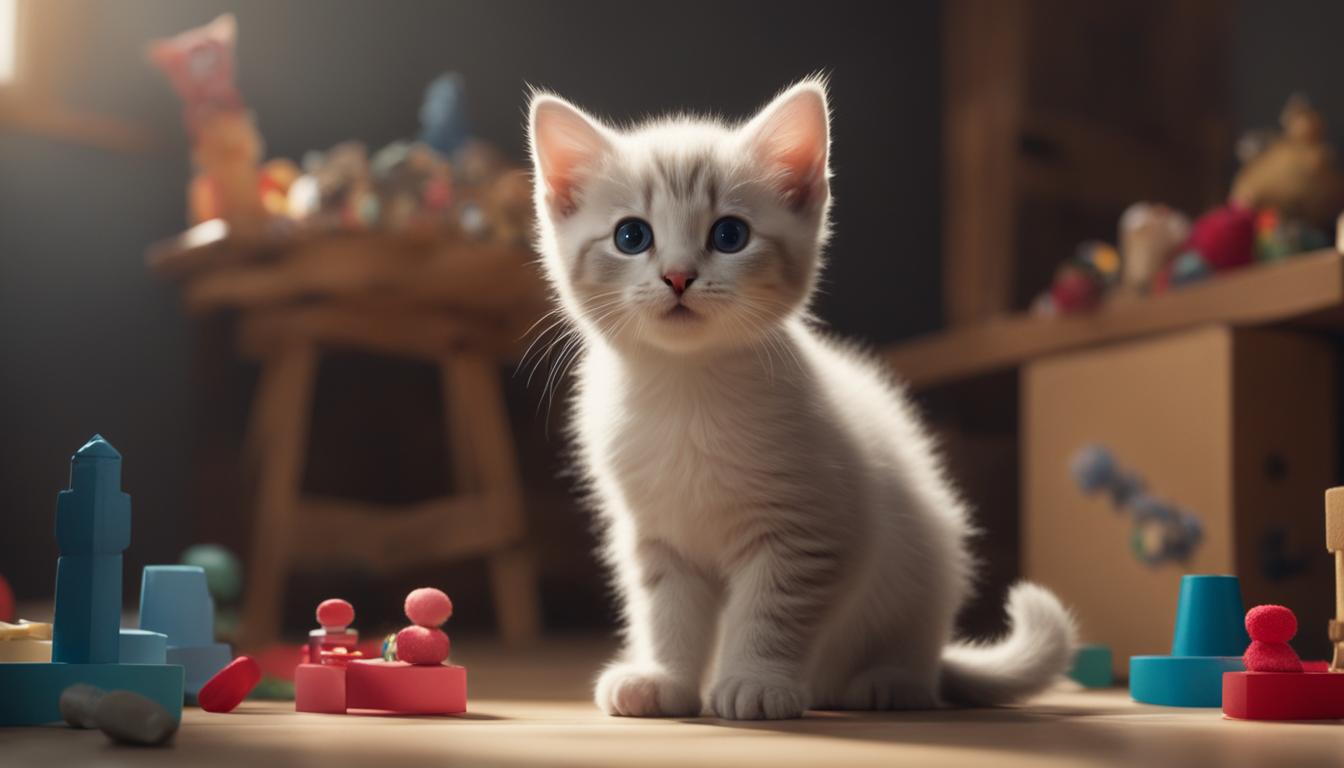Are you a proud owner of a single kitten? It’s important to understand the concept of single kitten syndrome and its implications on your furry friend’s well-being. Single kitten syndrome refers to the negative effects of raising a kitten without a companion. Without another kitten to interact with, your precious little one may experience aggression, anxiety, stress, and develop behavioral issues like inappropriate chewing and litterbox use.
To ensure the happiness and overall development of your pet, it’s crucial to have a clear understanding of single kitten syndrome and its potential impacts. By recognizing the symptoms, causes, and importance of socialization for kittens, you can take proactive steps to address and prevent single kitten syndrome.
Key Takeaways:
- Single kitten syndrome is the term used to describe the negative effects of raising a kitten without a companion.
- Kittens learn important social behaviors from their peers, and without another kitten to interact with, they may become aggressive, anxious, stressed, and develop behavioral issues.
- The symptoms of single kitten syndrome may include excessive vocalization, destructive behavior, and inappropriate elimination outside the litterbox.
- The causes of single kitten syndrome stem from the absence of social interaction and play with other kittens or cats during the early developmental stages.
- Socialization is crucial for kittens to develop proper behavior and skills necessary for healthy interactions with other cats and humans.
The Symptoms of Single Kitten Syndrome
Single kitten syndrome can manifest in various symptoms that indicate a kitten’s lack of socialization and companionship. By recognizing these symptoms, you can take appropriate measures to address the underlying issue and ensure your kitten’s well-being. Let’s explore the common symptoms of single kitten syndrome:
- Excessive clinging behavior towards humans: Kittens with single kitten syndrome may become overly dependent on human companionship, constantly seeking attention and physical contact.
- Excessive vocalization and attention-seeking: Lonely kittens may meow excessively, seeking interaction and companionship from their human caregivers.
- Obsessive suckling on clothing or other pets: Kittens deprived of social interactions may exhibit compulsive suckling behaviors as a substitute for the comfort they would receive from nursing on their mother or siblings.
- Biting or clawing during play: Without proper socialization, kittens may not learn appropriate play behaviors, resulting in rough play that includes biting and scratching.
- Destructive behavior like chewing and scratching: Kittens with single kitten syndrome may exhibit destructive behaviors like chewing on furniture or excessive scratching due to boredom and frustration.
- Urinating or defecating outside the litterbox: Stress and anxiety from single kitten syndrome can lead to litterbox issues, with kittens choosing to eliminate outside their designated area.
Recognizing these symptoms early on can help you take the necessary steps to provide your kitten with the socialization and companionship they need to thrive.
The Causes of Single Kitten Syndrome
The development of single kitten syndrome can be attributed to the absence of social interaction and play with other kittens or cats during the early stages of a kitten’s life. Kittens learn important social behaviors through interactions with their peers, such as bite inhibition and claw control. Without these experiences, a kitten may struggle to understand boundaries and exhibit inappropriate behaviors. The lack of feedback from littermates can have lasting effects into adulthood.
During their early developmental stages, kittens are highly impressionable and learn best from their interactions with other cats. These interactions facilitate the development of essential social skills and behaviors. Without the opportunity to engage with fellow kittens, a single kitten may not receive the necessary feedback and correction needed to understand appropriate play and social boundaries. Consequently, they may exhibit behaviors such as aggressive play biting, excessive attachment to humans, and increased dependency.
Additionally, the absence of socialization with other cats can lead to a lack of understanding of feline communication cues and social hierarchies. This can cause a single kitten to become anxious or stressed when faced with unfamiliar cats or new environments. The resulting anxiety and stress can contribute to the development of behavioral issues such as inappropriate chewing, scratching, and litterbox use, as well as excessive vocalization and attention-seeking behaviors.
Understanding the Impact of Single Kitten Syndrome
Without proper socialization, a kitten may struggle to develop the necessary skills and behaviors for healthy interactions with other cats. This can lead to long-term behavioral issues and a reduced quality of life for the kitten.
The impact of single kitten syndrome goes beyond the immediate behavioral issues. Kittens raised without companions may experience difficulties in forming social relationships with other cats later in life. They may struggle to understand feline communication cues and exhibit inappropriate behaviors due to a lack of proper socialization. This can lead to social isolation and a decreased overall well-being.
Furthermore, the increased dependence on human companionship may put a strain on the owner-kitten relationship. Constant mewing, attention-seeking behaviors, and inability to self-soothe can become burdensome for owners, who may struggle to provide the level of social interaction a kitten requires. Recognizing the impact of single kitten syndrome highlights the importance of early intervention and proper socialization to ensure the well-being and happiness of the kitten.
| Causes of Single Kitten Syndrome | Effects of Single Kitten Syndrome |
|---|---|
| Lack of social interaction with peers | Aggression towards people or other pets |
| Lack of feedback and correction from littermates | Excessive vocalization and attention-seeking |
| Insufficient development of bite inhibition and claw control | Obsessive suckling on clothing or other pets |
| Biting or clawing during play | |
| Destructive behavior like chewing and scratching | |
| Urinating or defecating outside the litterbox |
The Importance of Socialization for Kittens
Socialization is a critical aspect of a kitten’s development, shaping their behavior and interactions with other cats and humans. Through socialization, kittens learn important skills such as bite inhibition, claw control, and appropriate play behavior. It helps them understand boundaries and develop into well-adjusted adult cats. As a responsible pet owner, it is essential to prioritize and provide opportunities for socialization in order to ensure your kitten’s overall well-being and happiness.
One of the key benefits of socialization is that it helps kittens build confidence and reduce fear. By exposing them to various environments, people, and other animals at an early age, you help them become more adaptable and less anxious in unfamiliar situations. Socialized kittens are also more likely to have positive experiences with humans, making them more comfortable and friendly towards people throughout their lives.
To effectively socialize your kitten, it is important to expose them to a wide range of stimuli in a positive and controlled manner. This can include introducing them to different sounds, textures, and surfaces, as well as providing opportunities for supervised play and interaction with other cats. Gradually exposing them to new experiences while ensuring their safety and comfort will help them develop a well-rounded personality and enable them to handle new situations with ease.
The Benefits of Early Socialization
Early socialization has long-lasting effects on a kitten’s behavior and overall well-being. Kittens that are exposed to positive social experiences during the critical period between two to seven weeks of age are more likely to grow up to be confident, well-adjusted cats. They are less likely to exhibit fear-based aggression or inappropriate behaviors like excessive scratching or biting. Early socialization also plays a vital role in preventing behavior problems and improving the chances of successful adoption into permanent homes.
| Benefits of Socialization | How to Achieve Them |
|---|---|
| Confidence building | Expose kittens to various environments, people, and animals |
| Reduction of fear and anxiety | Gradually introduce new stimuli and experiences |
| Positive interactions with humans | Provide gentle handling, play, and positive reinforcement |
| Prevention of behavior problems | Ensure appropriate play and discourage rough behavior |
“Socialization is essential for kittens to develop into well-rounded and socially competent cats. By providing positive experiences and exposure to various stimuli, you are giving your kitten the best chance to grow into a confident and well-adjusted adult. Remember, socialization is a lifelong process, so continue to expose your cat to new experiences and interactions throughout their life.”
By understanding the importance of socialization and actively providing opportunities for your kitten to interact and learn, you are setting the foundation for a happy and harmonious relationship with your pet. Remember, every interaction matters, so make sure to create a positive and nurturing environment that encourages socialization and helps your kitten thrive.

The Impact of Single Kitten Syndrome
Single kitten syndrome can have a significant impact on the behavioral development and overall well-being of a kitten. Without the opportunity to interact with other kittens or cats, a single kitten may experience feelings of loneliness and isolation, which can lead to a range of negative behaviors.
One of the primary effects of single kitten syndrome is increased aggression. Without the presence of littermates to engage in appropriate play and socialization, a single kitten may resort to biting and scratching during playtime with humans or exhibit aggressive behavior towards other pets in the household.
Additionally, single kittens may experience heightened levels of anxiety and stress. The absence of social interactions and play opportunities with other cats can leave them feeling socially deprived, leading to feelings of insecurity and anxiety. This can manifest in excessive vocalization, restlessness, and destructive behaviors like inappropriate chewing and scratching.
| Impact of Single Kitten Syndrome | Symptoms |
|---|---|
| Increased aggression | Biting, scratching, aggression towards other pets |
| Heightened anxiety and stress | Excessive vocalization, restlessness, destructive behaviors |
Furthermore, single kittens may become excessively dependent on humans for social interaction. In the absence of feline companions, they may constantly seek attention from their human caregivers, leading to persistent meowing and a need for constant human presence.
Understanding the impact of single kitten syndrome underscores the importance of addressing it through proper socialization. By providing opportunities for interaction with other cats or adopting kittens in pairs, you can help mitigate the negative effects and promote the healthy development of your kitten.
Prevention of Single Kitten Syndrome
Preventing single kitten syndrome is essential for the well-being and development of your furry friend. By adopting some proactive measures, you can ensure that your kitten receives the necessary socialization and companionship. Here are some strategies to consider:
Adopting in Pairs
One of the most effective ways to prevent single kitten syndrome is to adopt two kittens together. By doing so, they can provide each other with valuable social interaction and learn essential behavioral skills from one another. This dynamic ensures that your kittens grow up well-adjusted and socially skilled, reducing the likelihood of developing single kitten syndrome.
Facilitating Socialization
If adopting two kittens is not feasible, you can still promote socialization by providing opportunities for your kitten to interact with other cats. Arrange supervised playdates or enroll your kitten in kitten socialization classes. These activities allow your kitten to practice appropriate social behaviors and establish positive relationships with other feline companions.
| Prevention Measures | Description |
|---|---|
| Creating an Enriched Environment | Ensure that your kitten has plenty of toys, scratching posts, and cozy spaces to explore and engage with. An enriched environment provides mental stimulation and helps prevent boredom, which can contribute to the development of behavioral issues. |
| Engaging in Interactive Play | Make time for daily interactive play sessions with your kitten. Use toys that promote physical activity and mental stimulation. These play sessions not only provide necessary exercise but also help in building a bond with your kitten. |
| Seeking Professional Guidance | If you notice any signs of single kitten syndrome in your kitten, consider consulting with a professional animal behaviorist or trainer. They can provide guidance and develop a tailored plan to address any behavioral issues and support healthy socialization. |
By implementing these prevention measures, you can minimize the risk of single kitten syndrome and ensure a happy and well-adjusted kitten.

Treatment of Single Kitten Syndrome
If your kitten is already displaying symptoms of single kitten syndrome, it is important to address the behavioral issues and provide the necessary socialization to help them thrive. Here are some strategies you can use to treat single kitten syndrome:
- Supervised playdates with other cats: Introducing your kitten to well-socialized and friendly cats can help them learn appropriate social behaviors and develop positive interactions.
- Interactive play sessions: Engage your kitten in interactive play using toys like feather wands or laser pointers. This not only provides mental and physical stimulation but also helps them burn off excess energy.
- Enriched environment: Create a stimulating environment for your kitten with scratching posts, climbing trees, and hiding spots. This allows them to engage in natural behaviors and prevents boredom.
It is worth noting that each kitten is unique, and the treatment approach may vary. If you are facing challenges in addressing single kitten syndrome, consider consulting a professional animal behaviorist or trainer. They can provide expert guidance tailored to your kitten’s specific needs and help you implement a comprehensive treatment plan.

By addressing the behavioral issues associated with single kitten syndrome and providing the necessary socialization, you can support your kitten’s emotional well-being and help them develop into a socially confident and content feline companion.
Raising and Socializing a Single Kitten
If you find yourself in a situation where you need to raise and socialize a single kitten, there are some important steps you can take to ensure their well-being and development. While it’s generally recommended to adopt kittens in pairs, providing plenty of social interaction and opportunities for the kitten to engage with other cats can help mitigate the negative effects of single kitten syndrome.
One of the key aspects of raising a single kitten is to be attentive to their social needs. Spend quality time with your kitten, engaging in interactive play sessions to provide mental and physical stimulation. This will help them develop social skills and bond with you, their human companion. Additionally, consider creating a safe and enriched environment with toys, scratching posts, and cozy spaces for the kitten to explore and enjoy.
To ensure proper socialization, it’s beneficial to introduce your single kitten to other cats in a controlled and supervised manner. This can be done through playdates or gradual introductions, allowing the kitten to interact with other cats in a safe and controlled environment. Keep in mind that each cat may have different personalities, so take the time to observe their interactions and intervene if necessary to prevent any aggressive behavior.
Benefits of Raising a Single Kitten
Raising a single kitten can have its advantages. The bond between you and the kitten may be stronger, as they rely on you for social interaction and companionship. This can lead to a deep and loving relationship. Additionally, as a single kitten, they may receive more focused attention and individualized care, which can help them feel secure and loved.
Remember, raising and socializing a single kitten requires extra attention and effort to ensure their well-being. By providing them with social interaction, engaging playtime, and opportunities to interact with other cats, you can help mitigate the potential negative effects of single kitten syndrome and raise a happy and socially well-adjusted cat.

Conclusion
Raising a single kitten and socializing them properly are essential for their overall development and well-being. Understanding the symptoms, causes, and impact of single kitten syndrome is crucial in ensuring a happy and well-adjusted cat.
Whether you choose to adopt kittens in pairs or raise a single kitten, it is important to prioritize their social needs. Providing plenty of social interaction, engaging in interactive play, and offering opportunities for the kitten to engage with other cats can help mitigate the negative effects of single kitten syndrome.
By recognizing the importance of socialization and taking appropriate preventive measures, such as adopting in pairs or providing supervised interactions with other cats, you can help your kitten learn proper social behaviors and develop into a well-adjusted adult cat. Additionally, seeking professional guidance from an animal behaviorist or trainer can be beneficial in addressing any specific behavior problems and promoting healthy socialization.
Remember, raising and socializing a single kitten requires extra attention and effort, but with the right approach, you can ensure that your single kitten grows into a happy, socially skilled, and well-adjusted feline companion.
FAQ
What is single kitten syndrome?
Single kitten syndrome is the term used to describe the negative effects of raising a kitten without a companion.
What are the symptoms of single kitten syndrome?
The symptoms of single kitten syndrome may include clinging behavior towards humans, excessive vocalization and attention-seeking, obsessive suckling on clothing or other pets, biting or clawing during play, destructive behavior like chewing and scratching, and urinating or defecating outside the litterbox.
What causes single kitten syndrome?
Single kitten syndrome is caused by the absence of social interaction and play with other kittens or cats during the early developmental stages.
Why is socialization important for kittens?
Socialization is crucial for kittens to develop proper behavior and skills necessary for healthy interactions with other cats and humans.
What is the impact of single kitten syndrome?
Single kitten syndrome can have a negative impact on a kitten’s behavioral development and overall well-being.
How can single kitten syndrome be prevented?
The best way to prevent single kitten syndrome is to adopt kittens in pairs or provide opportunities for them to interact with other cats.
How can single kitten syndrome be treated?
If single kitten syndrome is already present in a kitten, it is important to address the behavioral issues and provide the necessary socialization.
Can a single kitten be successfully raised and socialized?
While it is generally recommended to adopt kittens in pairs, there are instances where raising and socializing a single kitten can be successful.




